
|
«I hope to come to Spain for a concert later this year»
First of all, thank you so much for the possibility of this interview about your work for Doctor Who, focusing in the Matt Smith (The Eleventh Doctor) era. -How was the first decision, musically speaking, once the regeneration from David Tennant to Matt Smith was fulfilled?, was in your plans to give a new personality through your music to The Doctor, in order to differentiate Matt from the previous two ones, creating a theme like “I Am The Doctor”?. When in the process of creating the score for the fifth season did you reach that so called “moment of truth”, when a composer discovers, he has found THE THEME?
-How do you develop the thematic structure when you are starting a new season with one eye in the dramatic arc until the final episode, from the very first one?
-How have you confronted or faced the last episodes of the seventh season and “The Name of The Doctor”, the 50th Anniversary “The Day of the Doctor”, and the Christmas Special “The Time of The Doctor”, knowing that the journey was approaching an end for the eleventh?
-Making of the reunion of three Doctors (at first) a reality, in The Day of The Doctor, is a dream come true for fans of the show and your music. Please, tell us how you decided your approach to the 50th Anniversary musical score, and how the cameos of “old themes” (Tennant’s) and the powerful renditions to new ones (Smith’s & Hurt’s) were developed.
-Through your music, an emotional canvas is created for the story and its characters, are you conscious of the many emotions your music need to reach when you start an episode, and how do you feel when you can see the reactions of the viewers and the fans and you experience you have succeeded?
-Saying goodbye to a Doctor conveys so many emotions at once…, you reached a high peak with David Tennant’s goodbye, was it hard the farewell to another actor we can sense you have loved working for (and with) and musically say goodbye to Matt?
-At the 2013 Christmas Special, The Time of The Doctor, we start with nods of comedy and positive energy, remembering well known themes of the past (like Clara’s theme delicate rendition), to finally walk through an outstandingly emotional end of the journey, rescuing the “The Long Song” melody of the “The Rings of Akhaten” episode, developed melodically in the track “Infinite Potential”, to show us the most moving, heartbreakingly beautiful last reunion ever in the history of the show. I should add, no one single eye remain dry across the whole whovian universe. How did you develop the musical structure of the episode and what remembrances could you share with our readers about this journey?
-We listen a musical preview of Peter Capaldi’s new theme for The Doctor in the last minute of the episode, is there maybe a swashbuckling feel to it?, What can you advance us of the musical future for the new cycle? Have you thought already or compose something for the new evolution of the show?
-How do you see yourself in the next years regarding the show? Can you tell the fans that Murray Gold & Doctor Who will continue together for many seasons to come? I never say anything about the future. But I will certainly be present during series 8. Obviously I love the show. -Recently an Anthology of the music for the show has been released, with 4 Cds, have you participated in the selection of tracks and cues? Very soon as well, another 11 Cds History of The Doctor Anthology will be available, were you involved? If it is that so, what can you tell us in advance about your music selections for it?
-Every journey has an end and to finish this interview, we would love to know about your upcoming projects, those you can share information with us and our readers of course, in and out the Doctor world, the possibility of more concerts of Doctor Who music in the future, and the possibility of seeing you back in Spain at some Festival.
As David Tennant’s Doctor would have said: “I don’t wanna go…”, but thanks so much for your time, Murray. It has been an honor. Excellent, thank you! It has been a real pleasure.
|
Author
BIO: Murray Gold is one of the most successful TV composers of the last decade. Born in Portsmouth in 1969, Gold started playing the piano at the age of six, and in his teens he arranged for high-school brass ensembles. After studying History at Cambridge University, he worked on a theater production at the Edinburgh Festival and became a scriptwriter for Channel 5 before his first score of a BBC-TV adaptation of Vanity Fair launched his composing career. A regular stalwart of writer Russell T. Davies, Gold provided the soundtracks for Queer as Folk and Casanova, and in 2005 he became the musical director of the revamped Doctor Who, creating a new arrangement for its iconic theme tune (by Ron Grainer) and a myriad of new themes, motifs and melodies, unforgettable already for any “whovian” around the globe, time and space. Since then, several albums featuring the music for the sci-fi series have been released. Featuring vocal contributions from soprano Melanie Pappenheim and the Divine Comedy’s Neil Hannon, the collections have become the biggest-selling TV soundtracks in the U.K in history. In 2010 he performed at The Proms and arranged and orchestrated two live Doctor Who concerts at Cardiff’s Millennium Centre and London’s Royal Albert Hall. Gold has also scored several movies, including Death at a Funeral and Alien Autopsy, and wrote the soundtrack to Doctor Who spin-offs Torchwood and The Sarah Jane Adventures (Source: www.allmusic.com -Jon O’Brien- & Asier G. Senarriaga). Special thanks to Javier Burgos for the creation and design of the banner that announces this interview. https://www.youtube.com/watch?v=GoshjIsMMqM |


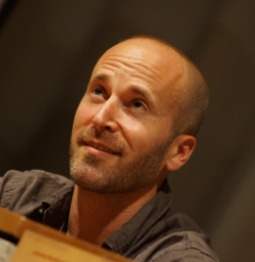
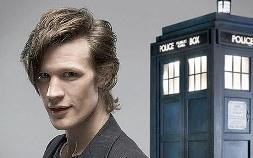 Asier, every new character brings a new energy, a new walk, a new way of talking, a new attitude, all contained within the character of The Doctor. Of course, after each series, we are all also one series older and one series more experienced so having completed the work with David as The Doctor, I started to think we needed something more energetic, faster and a bit more eccentric for the new doctor, whoever that was. When Steven (Moffat) sent me The Eleventh Hour (Matt’s first episode) it had a couple of moments (the speech on the roof to the Atraxi and the changing clothes sequence) which absolutely felt like they would define Matt Smith. I wanted to do something with a seven-beat so in, like in September 2009 I started sketching out the theme that became «I am the Doctor». Just consisted of three parts, the main riff, the little linking section on woodwind and the big rise. That was it. So simple. I remember the director saying he didn’t like the middle section and I said well I like it because it’s cute and funny and we disagreed but somehow it survived.
Asier, every new character brings a new energy, a new walk, a new way of talking, a new attitude, all contained within the character of The Doctor. Of course, after each series, we are all also one series older and one series more experienced so having completed the work with David as The Doctor, I started to think we needed something more energetic, faster and a bit more eccentric for the new doctor, whoever that was. When Steven (Moffat) sent me The Eleventh Hour (Matt’s first episode) it had a couple of moments (the speech on the roof to the Atraxi and the changing clothes sequence) which absolutely felt like they would define Matt Smith. I wanted to do something with a seven-beat so in, like in September 2009 I started sketching out the theme that became «I am the Doctor». Just consisted of three parts, the main riff, the little linking section on woodwind and the big rise. That was it. So simple. I remember the director saying he didn’t like the middle section and I said well I like it because it’s cute and funny and we disagreed but somehow it survived.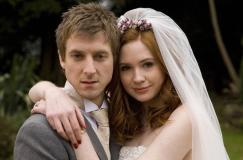 Sometimes I sit down with the exec producer because s/he is the only person other than Steven who knows where the show will be in thirteen episodes time. The scripts are not written but I might be given a general direction as to how something big will happen and I will plan it and try and sow the seed of it early on (like in Series 7, Rory and Amy’s ‘death music’ was in Episode One). I usually have a box of ideas waiting to use in emergency but usually the themes come because they are forced out of me by the exigencies of the schedule.
Sometimes I sit down with the exec producer because s/he is the only person other than Steven who knows where the show will be in thirteen episodes time. The scripts are not written but I might be given a general direction as to how something big will happen and I will plan it and try and sow the seed of it early on (like in Series 7, Rory and Amy’s ‘death music’ was in Episode One). I usually have a box of ideas waiting to use in emergency but usually the themes come because they are forced out of me by the exigencies of the schedule.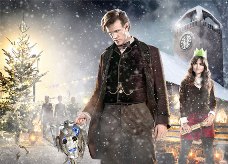 Well, both of these were long complicated stories with very simple moments but the main difficulty was clinging on to the story. The story is really all that matters and painting the emotions of the story is the job. When you think of it, the end only occupies a very small part of these episodes, so I just treat it all like it’s a normal end of series episode. Of course there is a heightened awareness that the end is coming that probably feeds into the music and makes it more fatalistic but that is something that would probably happen at any ending (whether it is a series ending or the end of a character).
Well, both of these were long complicated stories with very simple moments but the main difficulty was clinging on to the story. The story is really all that matters and painting the emotions of the story is the job. When you think of it, the end only occupies a very small part of these episodes, so I just treat it all like it’s a normal end of series episode. Of course there is a heightened awareness that the end is coming that probably feeds into the music and makes it more fatalistic but that is something that would probably happen at any ending (whether it is a series ending or the end of a character).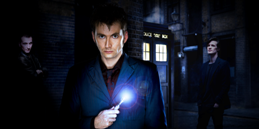 Well, it was a difficult episode. There were lots of people running around more nervous than usual. I don’t know why. Probably the fact that it was being simultaneously broadcast in all those countries. Honestly for me it was just an episode. It’s hard to put more into any episode because the whole music team (me and Ben and Jake and Gerry who records the orchestra) are already giving everything we can. I think really good work happens accidentally rather than by saying ‘now I am going to do my best work ever’…, if you don’t look up and follow your heart with the drama and are reasonably competent at writing music then it will be good…so, yes it was nice to bring back some David themes and to do some new music for Doctor 8 1/2.
Well, it was a difficult episode. There were lots of people running around more nervous than usual. I don’t know why. Probably the fact that it was being simultaneously broadcast in all those countries. Honestly for me it was just an episode. It’s hard to put more into any episode because the whole music team (me and Ben and Jake and Gerry who records the orchestra) are already giving everything we can. I think really good work happens accidentally rather than by saying ‘now I am going to do my best work ever’…, if you don’t look up and follow your heart with the drama and are reasonably competent at writing music then it will be good…so, yes it was nice to bring back some David themes and to do some new music for Doctor 8 1/2.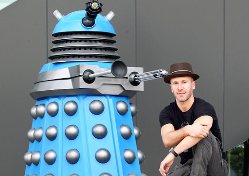 Yes! The reaction is important. I don’t write music that is esoteric or difficult. I try to write the landscape of inside me when I am watching the thing I am writing for. If people react a certain way to the music and it becomes like an album of memories that is a good thing. If you are making art for a gallery, that is a different matter. I try to give in my work. I hope that it sounds generous and kind hearted. And sometimes that it makes people become overwhelmed.
Yes! The reaction is important. I don’t write music that is esoteric or difficult. I try to write the landscape of inside me when I am watching the thing I am writing for. If people react a certain way to the music and it becomes like an album of memories that is a good thing. If you are making art for a gallery, that is a different matter. I try to give in my work. I hope that it sounds generous and kind hearted. And sometimes that it makes people become overwhelmed.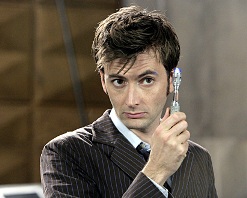 Well, it was a very different kind of goodbye. When David left, a character we had met before (the Ood) sang him to his death. That kind of space for music is quite rare in television. With Matt’s end, it was faster and perhaps he had already said goodbye many times in the episode. He had got old and he had expressed the pain of getting old and dying.
Well, it was a very different kind of goodbye. When David left, a character we had met before (the Ood) sang him to his death. That kind of space for music is quite rare in television. With Matt’s end, it was faster and perhaps he had already said goodbye many times in the episode. He had got old and he had expressed the pain of getting old and dying.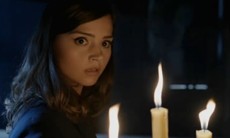 Hmm… I am very glad you felt that way. It was not an easy episode because structurally it was complex. It became even more important to make sure the audience were rooted in the emotion of the story. We had the music for Christmas (the town) and the Mainframe and then a series of riffs on Clara. I think it is interesting (and nobody has mentioned this) that we hardly used I Am the Doctor in Matt’s final episode. His main theme was almost completely absent. There really is a huge amount of music in that episode and I suppose it does have that pain (the fatalism) that I was talking about. I always had the feeling that Akhaten would be quoted when he left because the words (sleep now my warrior) seemed so melancholy and lost.
Hmm… I am very glad you felt that way. It was not an easy episode because structurally it was complex. It became even more important to make sure the audience were rooted in the emotion of the story. We had the music for Christmas (the town) and the Mainframe and then a series of riffs on Clara. I think it is interesting (and nobody has mentioned this) that we hardly used I Am the Doctor in Matt’s final episode. His main theme was almost completely absent. There really is a huge amount of music in that episode and I suppose it does have that pain (the fatalism) that I was talking about. I always had the feeling that Akhaten would be quoted when he left because the words (sleep now my warrior) seemed so melancholy and lost.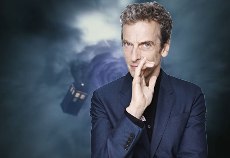 Well, I haven’t seen any of the new series yet so really I can’t tell you anything. I just had to change gear for the final scene at Christmas so I wrote, mmm yes!, you could say a swashbuckling theme but whether that is any clue to the future or not, I honestly don’t know…
Well, I haven’t seen any of the new series yet so really I can’t tell you anything. I just had to change gear for the final scene at Christmas so I wrote, mmm yes!, you could say a swashbuckling theme but whether that is any clue to the future or not, I honestly don’t know…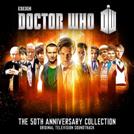 I left that to the other composers who are included on the anthology. Silva Screen find it very hard to get me to send the names of tracks and the liner notes for my CD’s and the S7 CD had just been released. I was completely bombed by work and besides, I think people have already heard enough from me.
I left that to the other composers who are included on the anthology. Silva Screen find it very hard to get me to send the names of tracks and the liner notes for my CD’s and the S7 CD had just been released. I was completely bombed by work and besides, I think people have already heard enough from me.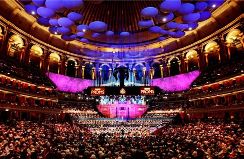 I hope to come to Spain for a concert later this year (stay tuned for news). It will be a great honor for me. I had a wonderful time in Cordoba and I feel humbled to be included in programs of music with such great composers. I have a piece of music premiering the night of the 18th of January at the Barbican in London and I am doing some great new shows, also a ballet and a musical. So I am busy.
I hope to come to Spain for a concert later this year (stay tuned for news). It will be a great honor for me. I had a wonderful time in Cordoba and I feel humbled to be included in programs of music with such great composers. I have a piece of music premiering the night of the 18th of January at the Barbican in London and I am doing some great new shows, also a ballet and a musical. So I am busy.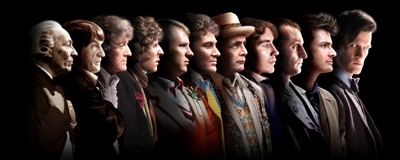

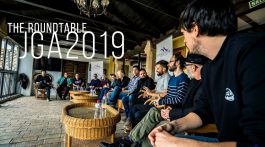
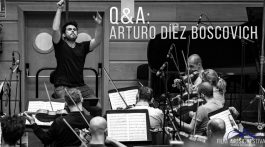
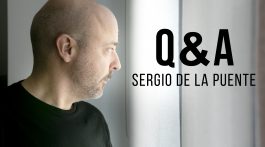
No hay comentarios